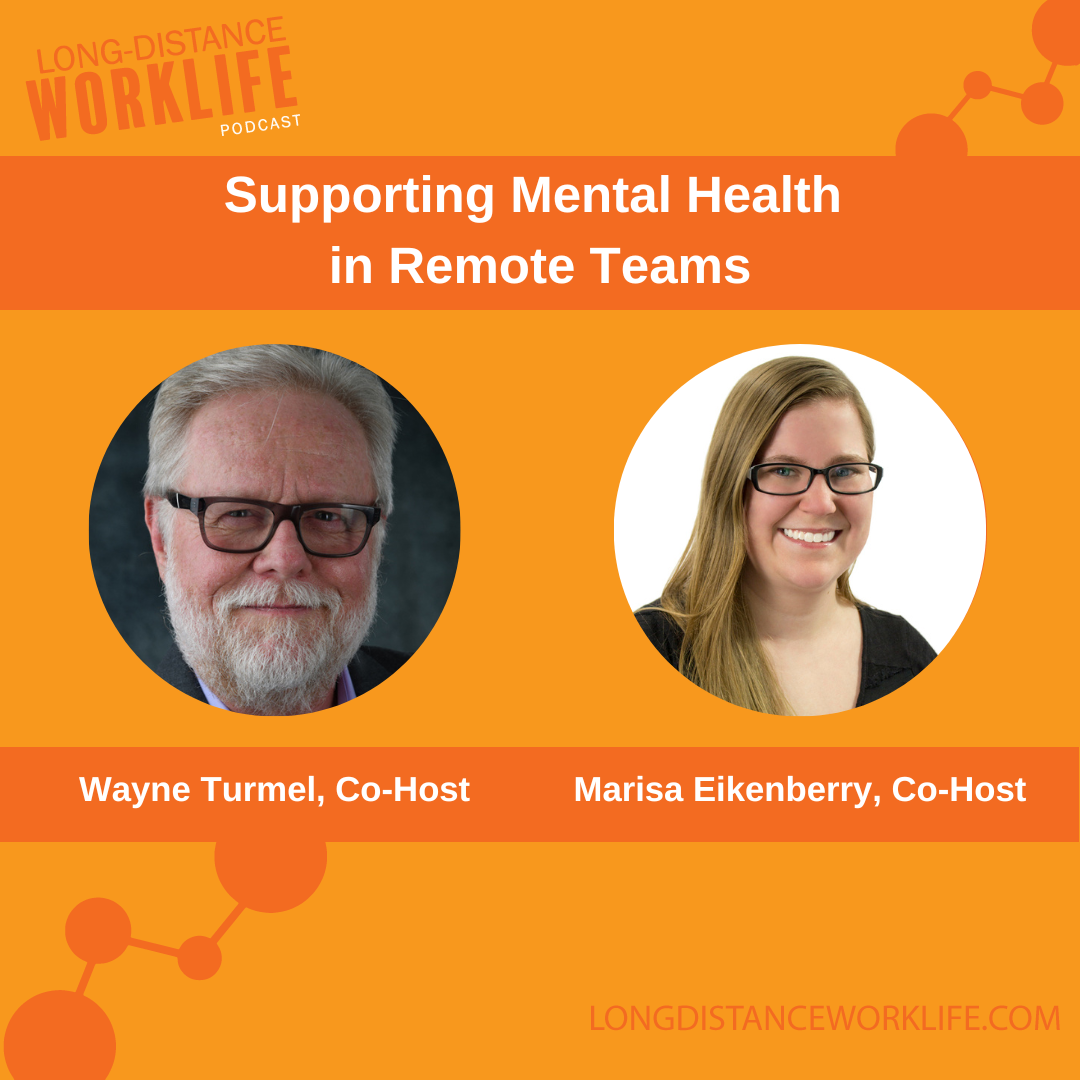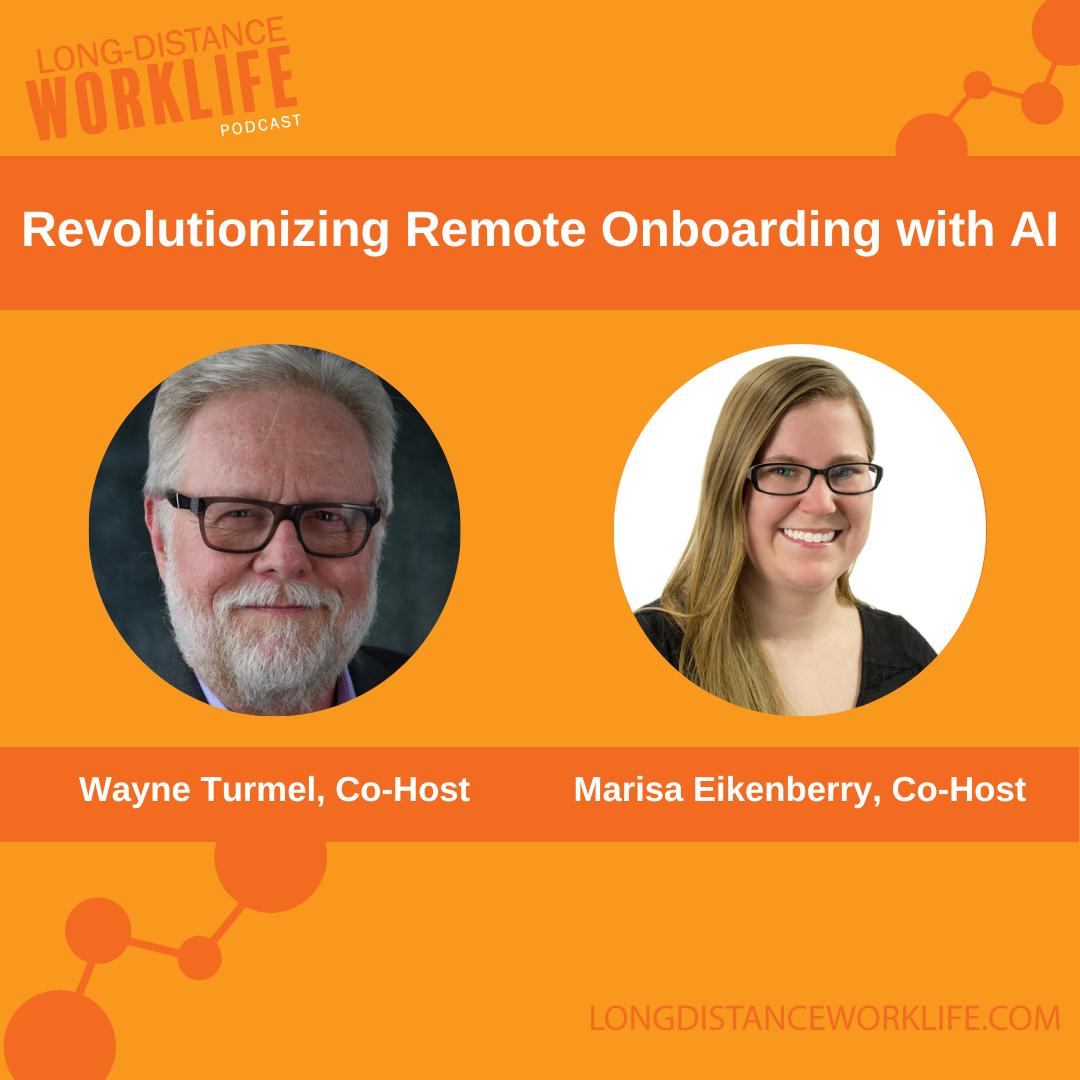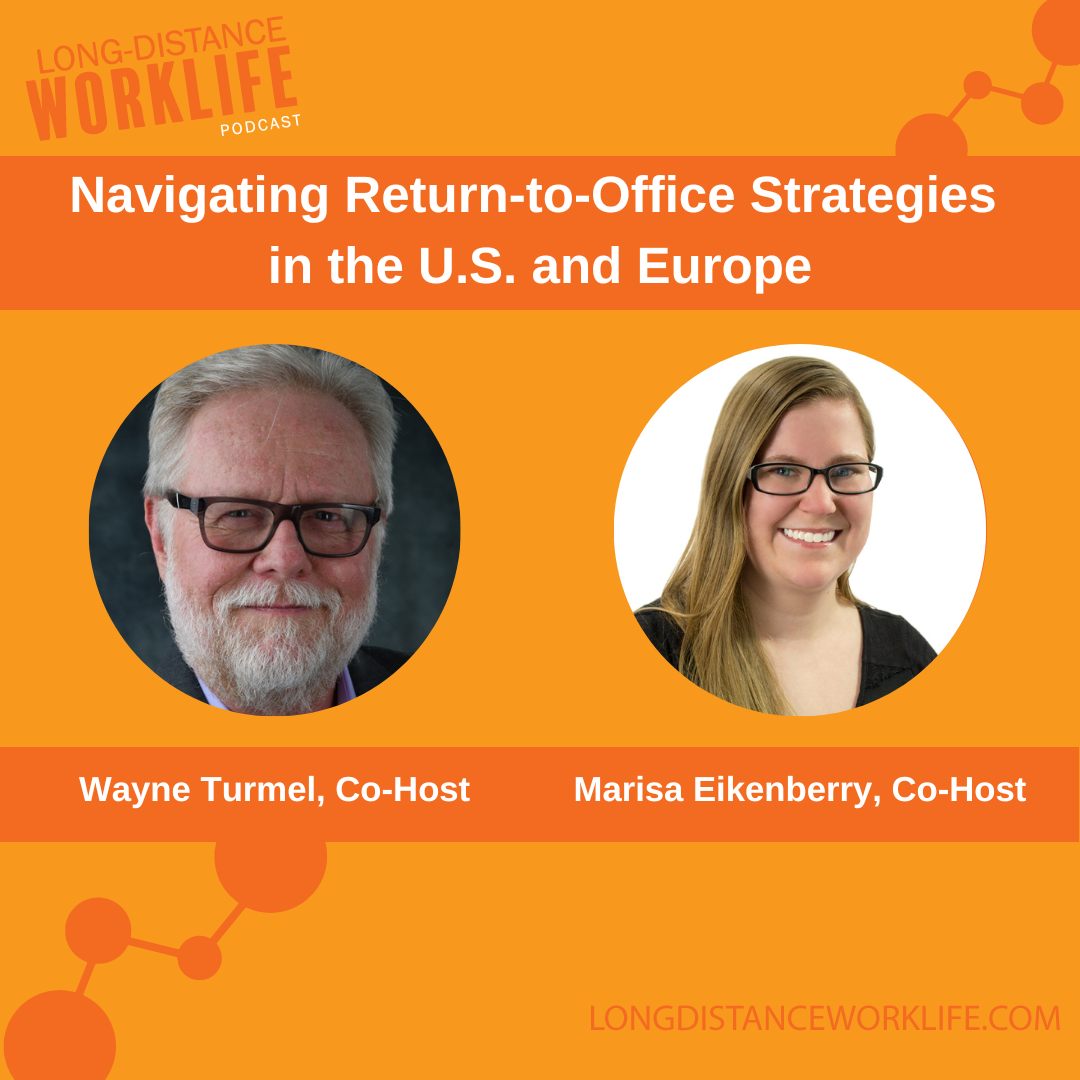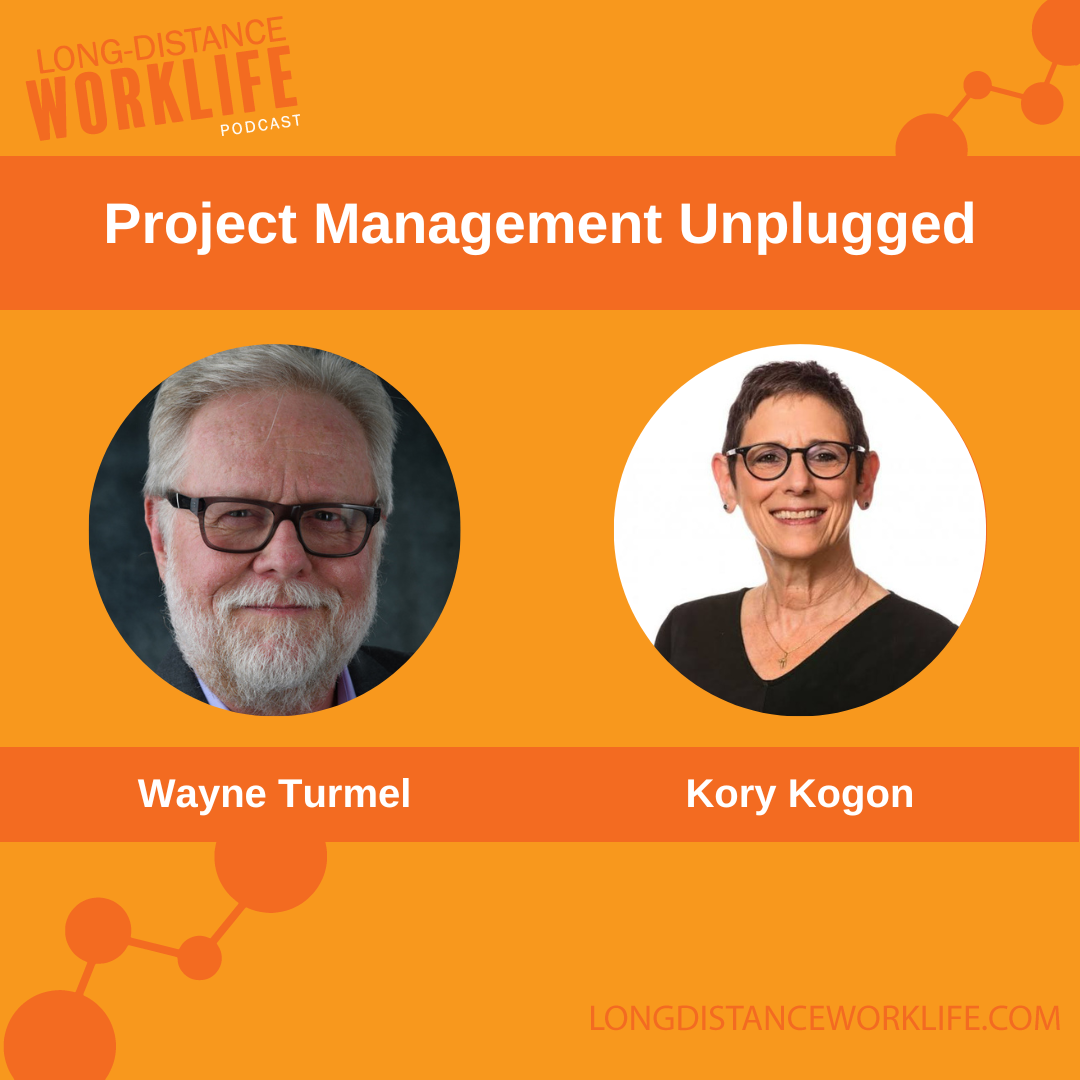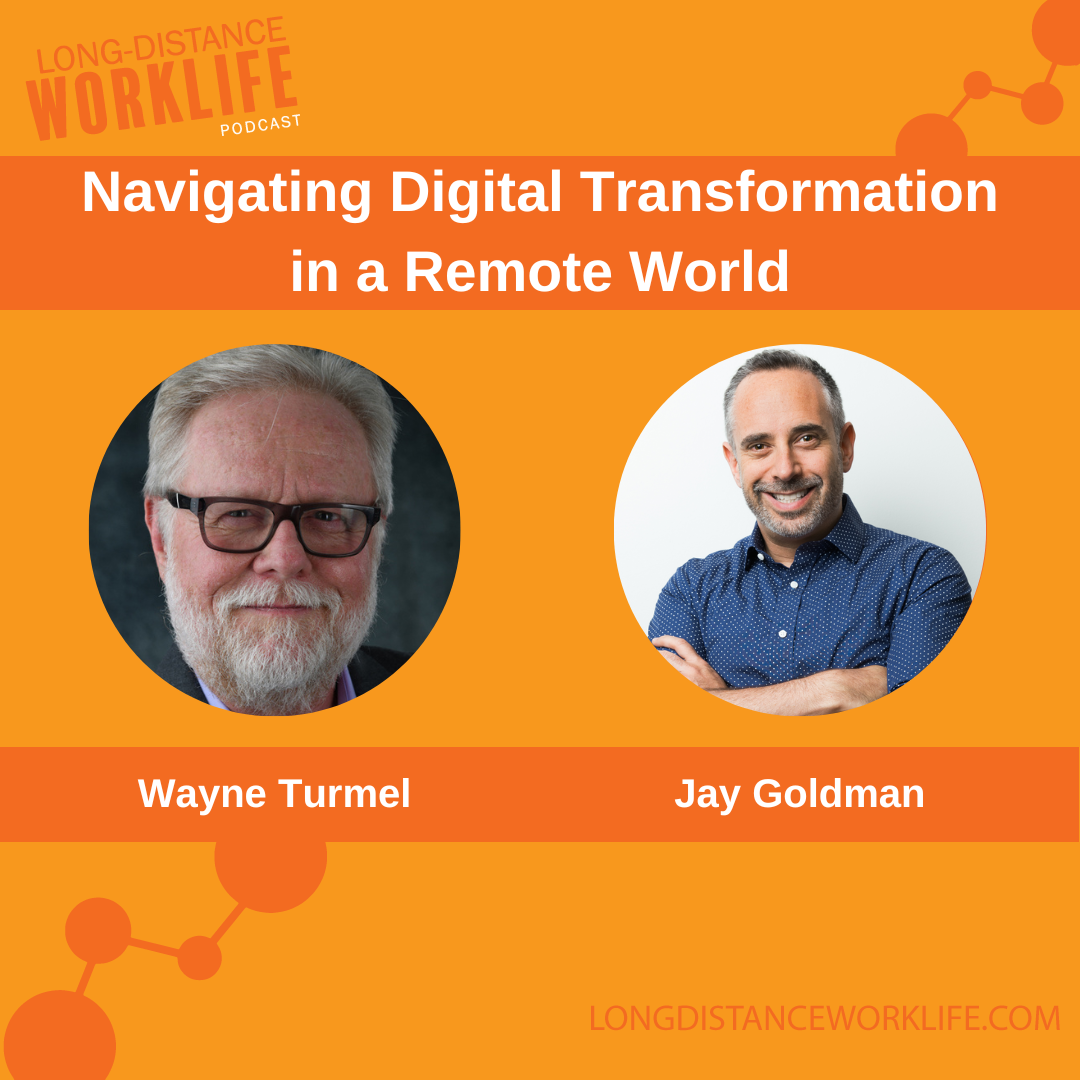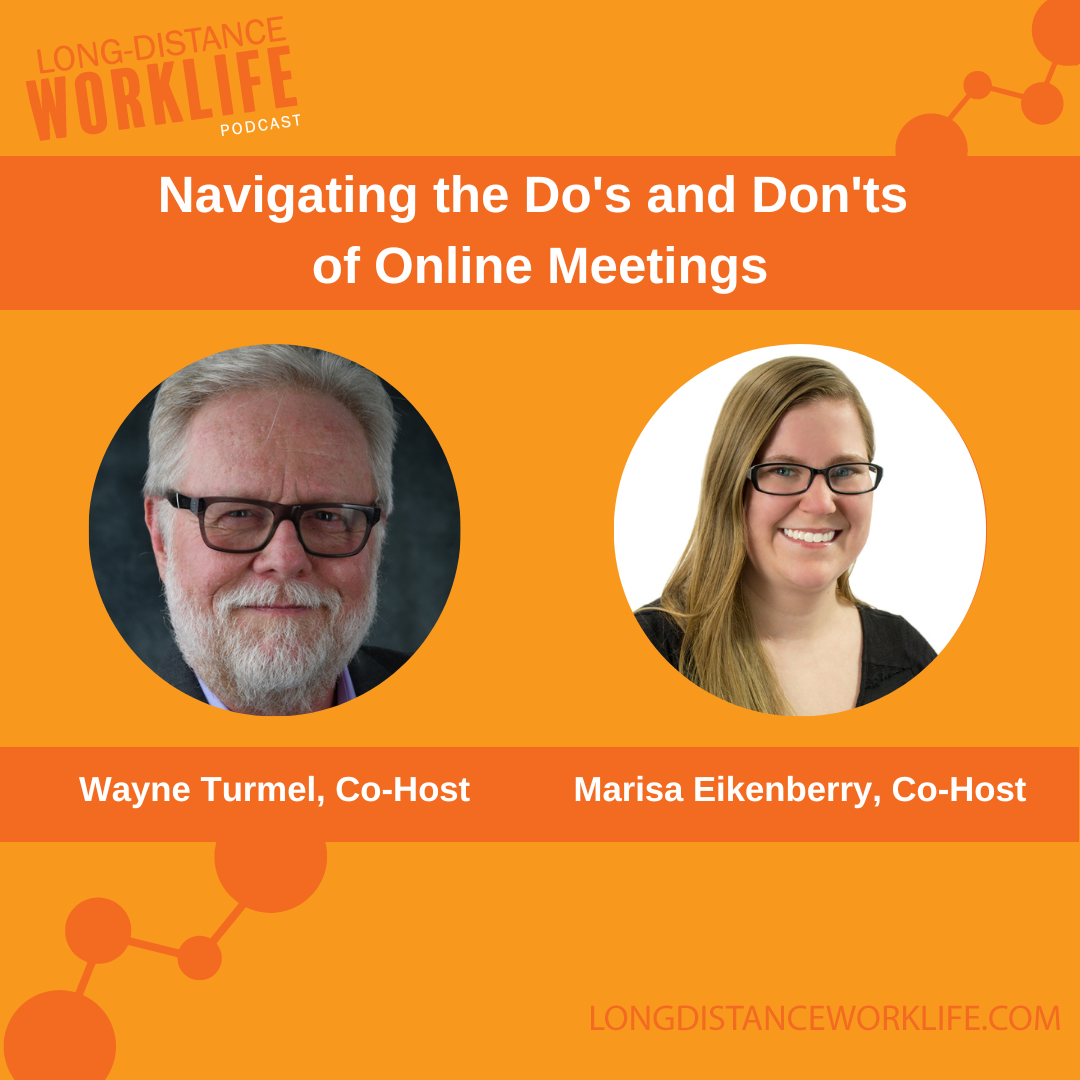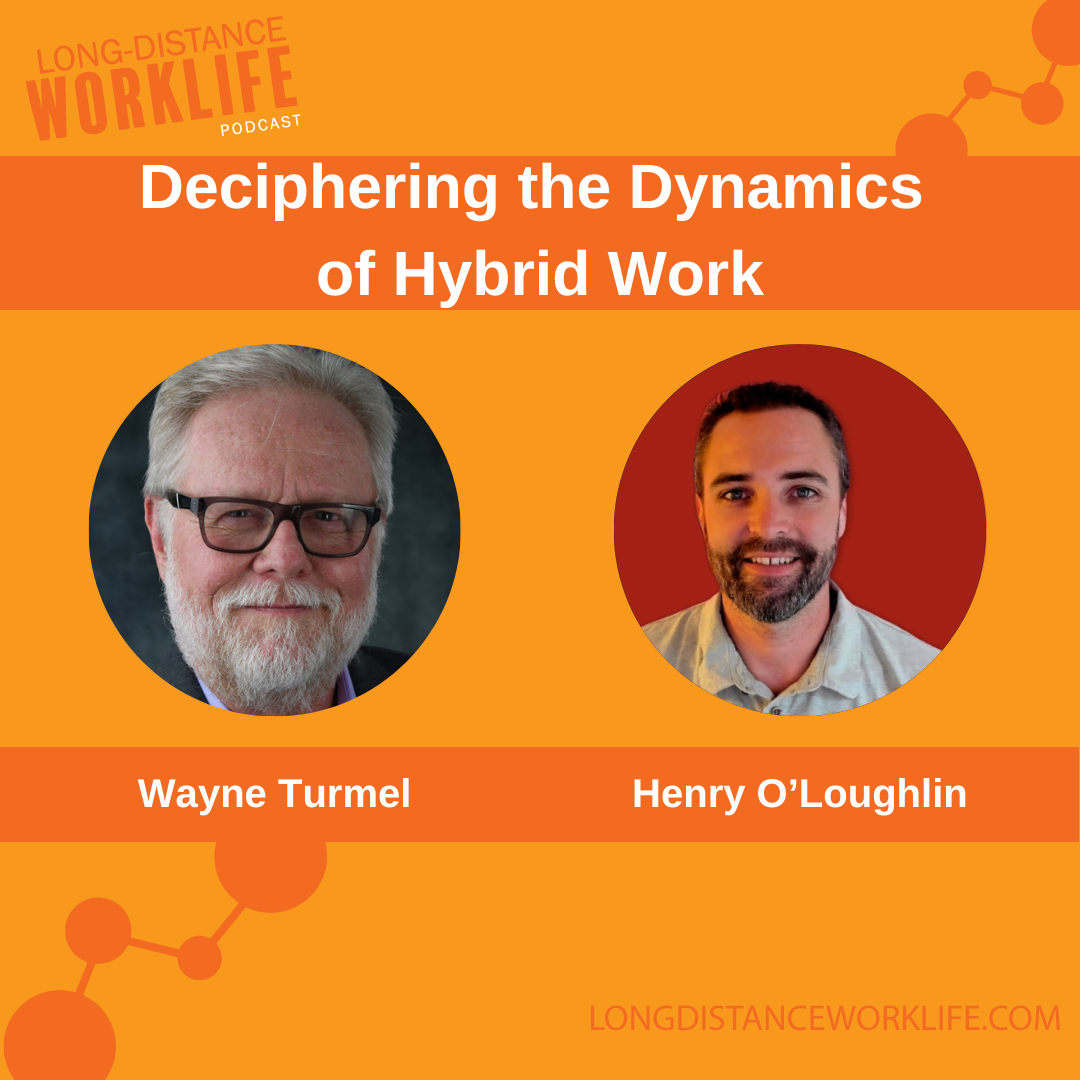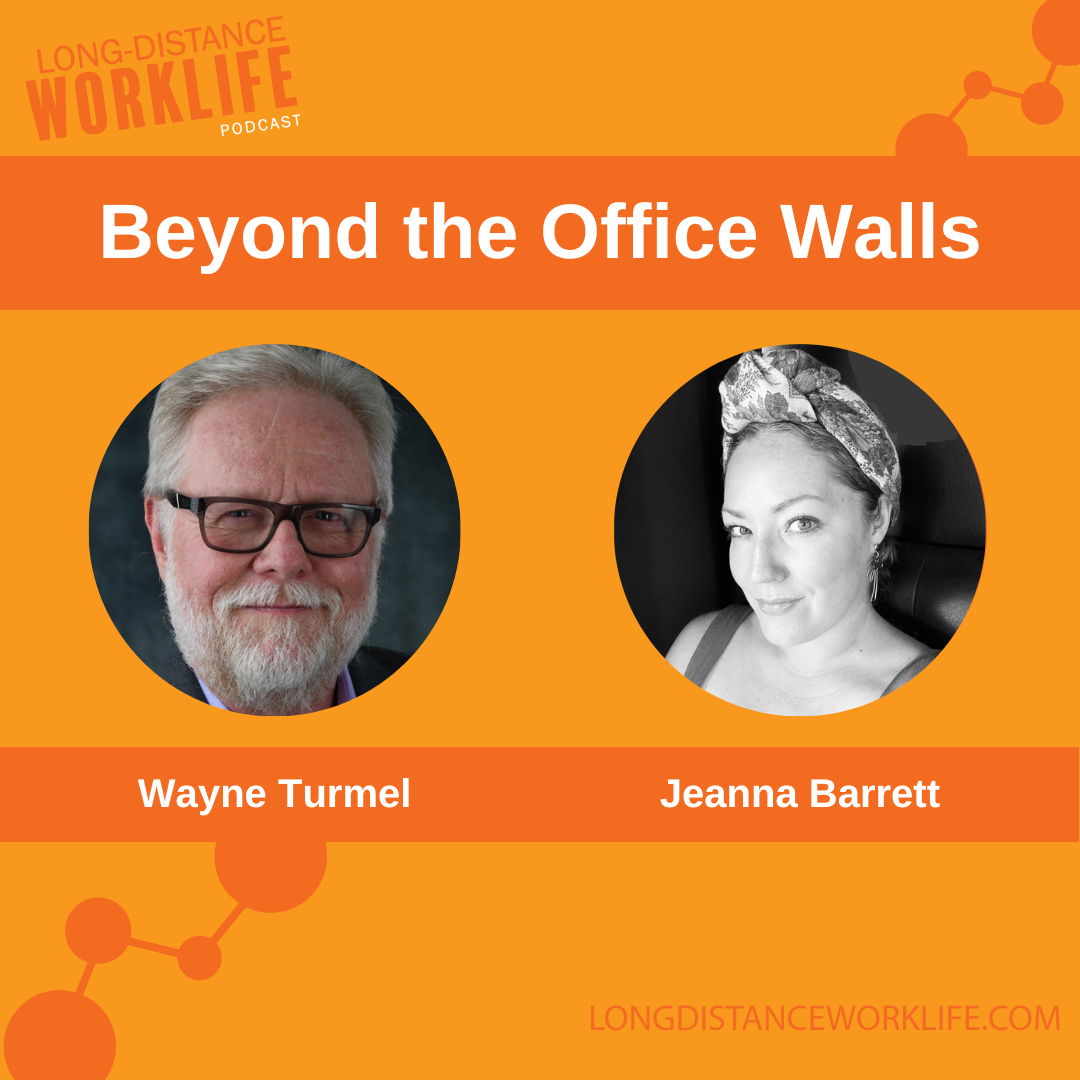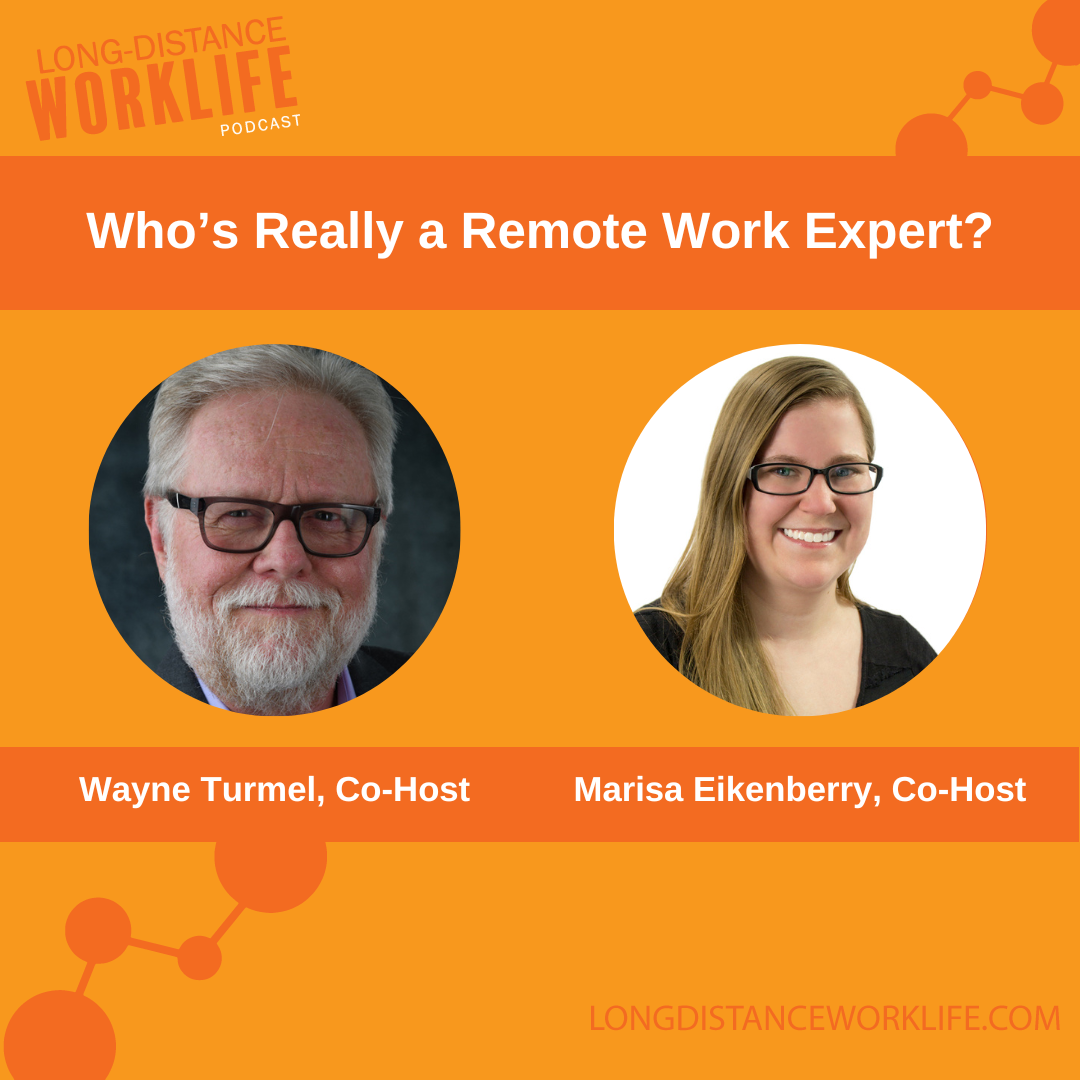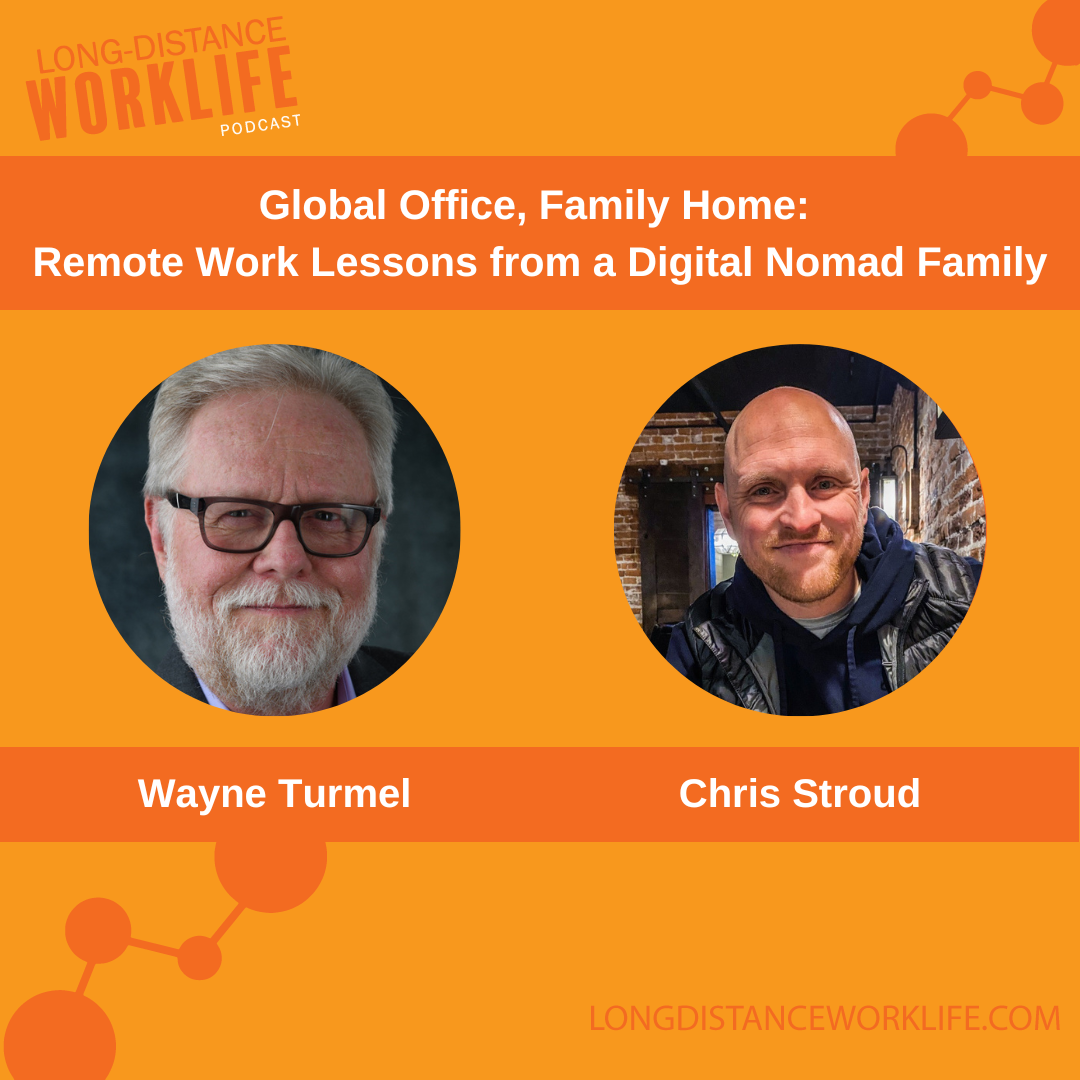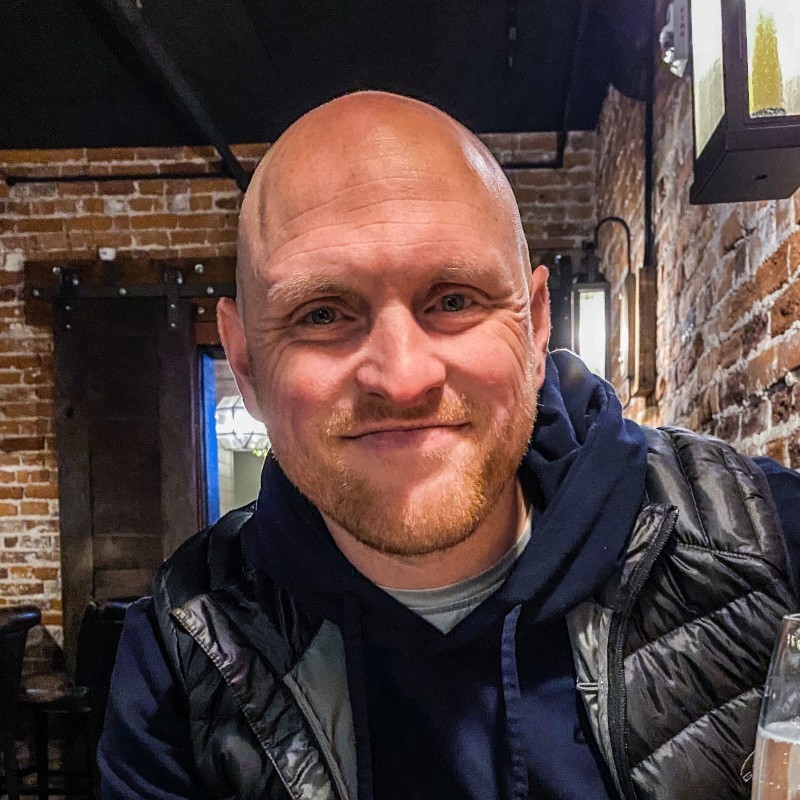Marisa Eikenberry and Wayne Turmel dive deep into the relationship between mental health and remote work. They explore the roles organizations play in supporting the mental well-being of remote employees and discuss various strategies and initiatives that can help. From the benefits of remote work for individuals with social anxiety to the challenges of isolation and blurred work-life boundaries, this episode provides practical advice for both leaders and team members. Tune in to discover how to foster a healthier remote work environment.
Key Points
00;00;08;06 - 00;00;18;28
Marisa Eikenberry
Welcome back to the long distance work life. We help you live, work and thrive in remote and hybrid teams. I'm Marisa Eikenberry, a fellow remote worker. And joining me is my co-host and remote work expert, Wayne Turmel.
00;00;19;02 - 00;00;21;27
Wayne Turmel
Hello, Marisa. How are you today?
00;00;21;28 - 00;00;23;08
Marisa Eikenberry
I'm great. How are you?
00;00;23;10 - 00;00;31;28
Wayne Turmel
I am, I am well today. Actually, I've thought about it and I've taken inventory. Yes, I am up and taking nourishment. And life is good.
00;00;32;01 - 00;00;56;11
Marisa Eikenberry
Well, thank God for that. And speaking of taking inventories of ourselves, we are actually going to talk about how mental health and remote work kind of go together. so one of the things like kind of wanted to start with and, Wayne, I know you did some research for this episode before we even got here, but, what roles do organizations play in supporting mental health of remote employees?
00;00;56;12 - 00;00;58;17
Marisa Eikenberry
Is that their job?
00;00;58;19 - 00;01;22;04
Wayne Turmel
see, that is the great question, right? Is what do employers owe their employees? What do their employees owe their employers? And in a strictly capitalist labor is services in exchange for money world. Technically, employers don't owe their employees much.
00;01;22;06 - 00;01;27;11
Marisa Eikenberry
Right? Which I'm sure will thrilled the people that are listening to. Well, right now.
00;01;27;13 - 00;01;54;03
Wayne Turmel
There is a much larger conversation to be had about what do we owe each other? Right? Is there a social contract? But to be purely technical, if we're just looking at the letter of the law, your employer doesn't owe you squat. Now, is it in the employer's best interest? Right. You have employees who can function at a high level and do good work and be productive.
00;01;54;03 - 00;02;17;19
Wayne Turmel
And the answer is yes. And so somewhere, like so much in this world, there is a balance where they say you know, we really need to support our employees, partly because we're not complete ogres, but also because it helps people get the work done. And that's what we're paying them for. That's so that an imbalance is always there.
00;02;17;19 - 00;02;38;23
Wayne Turmel
And some organizations take it very seriously. They offer lots of, benefits, support, mental health resources, which statistically is easy and inexpensive for them to do because most people do not take advantage of them.
00;02;38;25 - 00;02;46;08
Marisa Eikenberry
Right. So have you seen some examples or of policies or initiatives that companies have done that have made this effective?
00;02;46;10 - 00;02;55;12
Wayne Turmel
Sure. Well, here in America, it usually takes the form of, health insurance. That includes mental health.
00;02;55;18 - 00;02;58;04
Marisa Eikenberry
Support, which is huge by itself.
00;02;58;07 - 00;03;28;17
Wayne Turmel
Which is not to be sneezed. That, the big thing is that there are services out there which companies partner with and they say, hey, you know, as part of your employment package, you have access to X amount of counseling through this particular service, or you can get this particular package of resources and very often and those tend to be much larger companies.
00;03;28;20 - 00;03;57;18
Wayne Turmel
but they're there and it's important I mean I don't need to say this because if you listen to us for 30s, you understand that we are not mental health professionals and understand, dear listener, that we are speaking as lay people and people who care about you. and we are not doctors, so, you know, that needs to be said.
00;03;57;20 - 00;04;04;07
Wayne Turmel
everything we say needs to be examined and run through that filter.
00;04;04;10 - 00;04;27;05
Marisa Eikenberry
Well, and you were talking about different programs and things that, some companies do. One of the other things that I've seen some companies mention, or people mentioning that their companies are doing, would even be things like having a year long access to the calm app or the headspace app as like this kind of meditation can chill out for a second kind of thing.
00;04;27;08 - 00;04;36;10
Wayne Turmel
Yeah. And again, that gets done on an individual company and an individual team kind of basis.
00;04;36;13 - 00;04;37;28
Marisa Eikenberry
Right.
00;04;38;00 - 00;05;16;08
Wayne Turmel
you know, and there are things managers are doing. But one of the things that I think we need to to bear in mind is that there are benefits, there are mental health benefits to remote work, and there are some challenges. And leaders are often really uncomfortable because they aren't experts, either they aren't psychiatrists or psychologists, and they very often are dealing with their own feelings, thoughts, ideas.
00;05;16;11 - 00;05;48;14
Wayne Turmel
And so it is very difficult for them unless there is a really good communication process and unless we check in with each other on a regular basis, and pick up on what's happening, it's really easy for things, especially in a remote environment, for things to go unnoticed. I mean, if I'm in the office and Alice breaks down sobbing over her keyboard.
00;05;48;16 - 00;05;49;10
Marisa Eikenberry
Right.
00;05;49;12 - 00;05;54;05
Wayne Turmel
Right. It's pretty easy for me to go, oh, there's a problem here.
00;05;54;07 - 00;05;55;26
Marisa Eikenberry
All right. Alice, are you okay?
00;05;55;28 - 00;06;17;14
Wayne Turmel
And we're not being flippant about this. I mean, we see this every day in the workplace. Everybody is dealing with their own stuff. if Alice can hold it together for the 20 minutes of a zoom call, I have no idea if she's slumped over her keyboard when the camera's off.
00;06;17;17 - 00;06;32;04
Marisa Eikenberry
Right. Or to that point, too, because, you know, some people will do zoom meetings with cameras off to begin with. And if you haven't seen Joe in three weeks because he never turned his camera on, like you may have no idea that he's going through something.
00;06;32;06 - 00;06;44;00
Wayne Turmel
Yeah. So I, I think it's important that we look at, you know, what are some of the positive aspect. How does this positively affect mental health and how does it not.
00;06;44;02 - 00;07;07;00
Marisa Eikenberry
Right. So I know we've talked about some of these things before. So things like isolation or having blurred boundaries between, you know, when you're working and when you're home. but one of the other things is like, you know, obviously we have a bunch of stressors. So what are some stressors for remote workers that you've noticed and how can they be effectively managed?
00;07;07;02 - 00;07;42;21
Wayne Turmel
Well, one of the big stressors for remote workers is that they are very often torn. I mean, we saw this during Covid. This became blatantly aware, during Covid where people were dealing with death and illness and, you know, those types of things that were going on in the background of, oh, and by the, you know, I need to get my kids schooled and I need to look after my parents, and I need and I don't feel that good myself.
00;07;42;25 - 00;08;18;04
Wayne Turmel
And oh, by the way, I need to keep my job. And so I need to put on a good face or they'll make me go back into the office right? Right. And and so that split loyalty for some people, it's very easy. They can compartmentalize very well. Again, not everybody can of course. Right. And to say, oh, we gave you the same chance we give everybody else may well be true and it may save your conscience.
00;08;18;06 - 00;08;40;22
Wayne Turmel
I'm not entirely sure it's the best way to look at it. for managers and leaders out there. I know that I myself and I've told a similar story to this before. I used to kind of judge everybody's actions and effectiveness and motives by what was going on with me.
00;08;40;25 - 00;08;42;01
Marisa Eikenberry
Don't we all?
00;08;42;03 - 00;08;42;23
Wayne Turmel
Well.
00;08;42;25 - 00;08;44;20
Marisa Eikenberry
At least to start, until we know.
00;08;44;20 - 00;09;09;25
Wayne Turmel
That that self-awareness is really, really important, right? I remember very early in my career, I was talking to my boss's wife, who happened to be part of the business, and she was very judgmental. Somebody was having what was clearly a mental health episode, although we didn't call it that at the time. Right. and she goes, well, I wish I had time for that.
00;09;09;28 - 00;09;19;13
Wayne Turmel
You know, I was busy raising a child and running a business, and bye bye bye bye bye. And I just didn't have time to whine and feel sorry for myself, was how she phrased it.
00;09;19;16 - 00;09;22;05
Marisa Eikenberry
Wow, she sounds delightful.
00;09;22;08 - 00;09;34;29
Wayne Turmel
And you know what she is? She is a lovely person, but she white knuckled her way through most of the crises in her life. And if she can do it, why can't everybody else?
00;09;35;01 - 00;09;36;18
Marisa Eikenberry
And but I just not like that.
00;09;36;25 - 00;10;03;08
Wayne Turmel
Well, I came across an analogy and it was during the Northridge earthquake. Okay. We lived in Southern California in in Northridge, in the center of the quake zone. And the ground, if you can picture taking a carpet and kind of flipping one end of it and it rolls, that's what the ground did. And as a result, the house, there were three houses next to each other.
00;10;03;08 - 00;10;09;03
Wayne Turmel
We were in the middle. The house on one side was almost completely destroyed.
00;10;09;06 - 00;10;10;07
Marisa Eikenberry
Wow.
00;10;10;10 - 00;10;20;24
Wayne Turmel
Our house suffered damage but was functional and we could live in it and all that good stuff. And the house next to us got almost nothing.
00;10;20;26 - 00;10;21;26
Marisa Eikenberry
Wow.
00;10;21;29 - 00;10;33;22
Wayne Turmel
All three houses were the same builder. They were built at the same time. They had the same floor or plan and got hit by the same earthquake.
00;10;33;25 - 00;10;35;18
Marisa Eikenberry
With three different outcomes.
00;10;35;20 - 00;10;41;00
Wayne Turmel
And yet had completely different results.
00;10;41;02 - 00;10;41;29
Marisa Eikenberry
Right?
00;10;42;01 - 00;11;13;25
Wayne Turmel
Three different outcomes. And that analogy has stuck with me when we're talking about this. And so, you know, you take something like isolation. for one person, isolation might be the best thing I can get my work done. My work requires focus. And being able to work and maybe listening to my body a little bit. So sometimes a day work better than others, and I don't get bothered by people like that.
00;11;14;00 - 00;11;42;19
Wayne Turmel
So isolation, or at least being more alone makes sense. And that works for me. For other people, it exacerbates what other problems they have. Again, during Covid and not making light of anything. The number of teens harming themselves during Covid during the the school shutdown here in Clark County, double.
00;11;42;21 - 00;11;45;24
Marisa Eikenberry
Yeah, I'm not surprised.
00;11;45;26 - 00;12;08;01
Wayne Turmel
Well and so isolation is really tough. And as a leader how do you manage that with your team. Right. Is somebody quiet because they're quiet. Are they quiet because there's something else going on. And so check ins and I don't mean you have to put them on a couch and ask deep, you know.
00;12;08;02 - 00;12;08;18
Marisa Eikenberry
Yeah.
00;12;08;21 - 00;12;16;12
Wayne Turmel
Probing questions about your psyche. but legitimately checking it.
00;12;16;14 - 00;12;20;24
Marisa Eikenberry
Absolutely. And that's why one on one so. Right.
00;12;21;01 - 00;12;23;16
Wayne Turmel
It's it's really, really critical.
00;12;23;18 - 00;12;38;07
Marisa Eikenberry
Changing direction directions a little bit and going into some of the benefits, that remote work can have with mental health. So can you discuss how remote work might actually act as like a safe haven for individuals with social anxiety?
00;12;38;10 - 00;13;12;09
Wayne Turmel
Yeah. Exactly. Right. It's, you know, the number of people who. Experience social anxiety is higher than we've ever thought, because people have always just kind of white knuckled their way through it. What remote work has allowed people to do is not have to deal with some of those stressors, that we have to work with. You know, commutes are horribly stressful.
00;13;12;09 - 00;13;54;21
Wayne Turmel
By the time you get to the office, you're already freaked out. we are experiencing an era where, people are afraid to speak up for whatever reasons. social tensions on things like politics and what's going on in the world and all that stuff is making the workplace a very stressful environment. And for those who are, well, bullying, for lack of a better word, which sounds very grad school but goes on in the workplace all the time, is actually on absolutely.
00;13;54;24 - 00;14;32;04
Wayne Turmel
What we've experienced is that remote work removes some of that. And I'll give you an example. we're hearing that and this is all anecdotal, but it's pretty widely documented that people who traditionally don't speak up. Right, whether because they are socially anxious, whether because there's a power imbalance, whatever that is, are more comfortable speaking up because I don't have to sit in a conference room with Bob staring daggers at me if I disagree with his idea.
00;14;32;11 - 00;14;37;20
Wayne Turmel
And oh, by the way, Bob is going to follow me all the way back to my desk, haranguing me for it.
00;14;37;22 - 00;14;59;23
Marisa Eikenberry
Right? Yeah. Well, and to give you another perspective too, because like, I mean, I, I have a fair amount of social anxiety. I am an anxious person by nature. This will shock no one who actually knows me. but for me, I'm not necessarily like, obviously I've worked on our team for ten years. I trust the team members.
00;14;59;23 - 00;15;21;19
Marisa Eikenberry
I trust our coworkers. I know that it's not a, you know, waves, not staring daggers at me across the room. Like, don't you dare say anything. Like, that's not happening. But for me, I'm somebody that I want to work so hard not to interrupt a conversation. So if we're all at a conference table and everybody's talking, or even during a team meeting on the web, everybody's talking all at once.
00;15;21;19 - 00;15;38;17
Marisa Eikenberry
I have something to say. But there's no breath for me to do it. And if there's no breath, I'll never say it. But now I can open up a chat window and I can post it in there, and somebody might be able to see it and then go, oh, hey, she just said this and it can get added to the conversation.
00;15;38;17 - 00;15;44;10
Marisa Eikenberry
And then maybe that gives me an opportunity to go off mute and say something else.
00;15;44;12 - 00;16;27;04
Wayne Turmel
Yeah. Which brings us to the power of you're absolutely right. The chat feature in meetings is frequently, underutilized and underappreciated. It allows those who maybe aren't as comfortable speaking up or can't find a good time. Like me says, making air quotes to to contribute allows them to do that. There is also the asynchronous component of things like teams and chat and slack, where you don't have to have that brilliant idea right there in the middle of the conversation.
00;16;27;06 - 00;17;02;16
Wayne Turmel
You have time to think about it. You can actually use AI to. There are so many tools now that you can say, hey, I want you using Grammarly, for example. Yeah. you know, I want this to sound friendly or I want this to sound professional or whatever. You can write what you're doing and it will adjust the tone for you till it sounds like you think it should sound so that you are not lashing out anymore.
00;17;02;19 - 00;17;38;01
Wayne Turmel
Right? This is this is actually an ability to communicate more effectively, not display your anxiety. not add to anyone else's. Because very often, and those of us who tend to make jokes, those of us who tend to be, a little more assertive than others frequently add to other people's burdens without meaning to write. you didn't have to agree that quickly.
00;17;38;04 - 00;17;39;22
Marisa Eikenberry
I mean.
00;17;39;24 - 00;17;41;09
Wayne Turmel
And it's true.
00;17;41;12 - 00;17;43;19
Marisa Eikenberry
Yeah.
00;17;43;22 - 00;18;03;09
Wayne Turmel
So, you know, and we could go on for a long time about this, but I think that the key here is that as individuals, we need to kind of take inventory periodically. How am I doing.
00;18;03;12 - 00;18;04;18
Marisa Eikenberry
Right. Right.
00;18;04;20 - 00;18;08;00
Wayne Turmel
Why am I doing that way? Why am I doing that.
00;18;08;02 - 00;18;11;09
Marisa Eikenberry
Yeah, right. Is it something on my end or. It's something.
00;18;11;11 - 00;18;46;28
Wayne Turmel
Trivial? Is it something identifiable that I can deal with or that I need help dealing with? Is it a more general sense of anxiety or fear or whatever it is? It starts there, right? As leaders, are we checking in even if we don't have high priced psychological resources and mental health benefits and all of that stuff? We can check in and say, how are you doing?
00;18;47;00 - 00;18;49;16
Marisa Eikenberry
Yeah, it's as simple as that.
00;18;49;18 - 00;19;12;20
Wayne Turmel
It's really important and that we listen to the answer without judgment. I, I, I have worked from home for most of my career, pretty much full time, almost 20 years, and I have had times when I'm doing great and times when I'm not doing so great.
00;19;12;23 - 00;19;16;00
Marisa Eikenberry
Yeah, me too. And I've done half that time.
00;19;16;02 - 00;19;43;21
Wayne Turmel
And it takes courage. And that's a word that gets thrown around a lot. But it takes courage to raise your hand and say, hey, this is not working for me. I mean, very recently I said to Kevin, I need to stop doing this. Yeah. Certain things because this is not working. Right. There are projects that I was working on.
00;19;43;29 - 00;20;03;19
Wayne Turmel
I can't do that right now. I am not, and I'm a grown man who has done this a lot. And it's, you know, but I was completely overwhelmed and I wasn't I wasn't moral in terms of what's on my plate. It wasn't worse than anybody else has. You have a busier agenda than I do most days.
00;20;03;21 - 00;20;20;26
Marisa Eikenberry
But to be honest, the thing, you know what? Everybody's perspective is going to be a little different, like what your busy is and what my business might look different, what I can handle versus what you can handle might look different. And that's okay. That doesn't mean that one of us is better or not than the other person.
00;20;20;28 - 00;20;54;21
Wayne Turmel
And that's the thing is the removal of judgment. We have to stop judging ourselves and be observant of what's happening and why it's happening, and be as honest with ourselves as we can. When others reach out to us, we need to be honest to them. You don't need to share everything right? But understand that they're coming from a place of they want to help and it may be that remote work is not great for you.
00;20;54;23 - 00;21;11;13
Wayne Turmel
It may be that being in the office every day and fighting the commute and dealing with the crowds and all that stuff, maybe you need to back off a little bit and think about, maybe a more flexible work schedule.
00;21;11;16 - 00;21;14;09
Marisa Eikenberry
yeah, maybe a hybrid is the thing that works the best for you.
00;21;14;11 - 00;21;37;06
Wayne Turmel
Yeah, nothing is one size fits all. But if we leave you with nothing else in this session, I think we need to recognize that how we work is a part of our life. It is not all of our life. If it is, you need to reexamine some things.
00;21;37;08 - 00;21;37;28
Marisa Eikenberry
Right?
00;21;38;01 - 00;22;10;17
Wayne Turmel
how and why and what we do as work is part of our life, and you can't just portion it off from everything else. Absolutely. And good leaders understand that. Good organizations consider that when they're looking at the the health and, state of their employees. And as individuals, we need to think about that as well. And so there are things like apps that can help us be more mindful.
00;22;10;24 - 00;22;42;15
Wayne Turmel
There are things like meditation. There are things like, getting off your chair and going to that office function even when you don't want to. If that's going to help get you out of whatever you're in. so I hope that was helpful for folks. The big thing that I want people to remember is, whatever it is, it's not just you.
00;22;42;18 - 00;23;04;20
Marisa Eikenberry
Amen to that. Wayne. Thank you so much for this episode. this was really great conversation. I really hope that it's helpful to our listeners and listeners. Thank you so much for listening to the Long Distance work life. Our show notes, transcripts, and other resources. Make sure to visit Long Distance Work life.com if you haven't yet, subscribe to the show so you don't miss any future episodes.
00;23;04;28 - 00;23;19;29
Marisa Eikenberry
While you're there, be sure to like and review. This helps us know what you like about our show. Feel free to contact us via email or LinkedIn with the links in our show notes, and let us know you listen to this episode, or even suggest a topic for Wayne and I to tackle in a future episode. We'd love to hear from you!
00;23;20;02 - 00;23;46;01
Marisa Eikenberry
And before we sign off, I want to tell you about our long distance Leadership series at Kevineikenberry.com/ldls. Whether you're a seasoned leader or stepping into a remote leadership role for the first time, this series offers practical tools and expert advice to help you succeed. It's great for individuals or your whole leadership team. Again, that's Kevineikenberry.com/ldls. Let's start strengthening your remote leadership skills today.
00;23;46;04 - 00;23;54;03
Marisa Eikenberry
Thank you so much for joining us. And as Wayne likes to say don't let the weasels get you down.
00;23;54;06 - 00;23;58;20
00;23;58;22 - 00;23;59;13
Timestamps
0:00 Introduction
1:00 The Role of Organizations in Mental Health
3:40 Examples of Effective Mental Health Policies
6:30 Benefits and Challenges of Isolation
8:00 Managing Stressors in Remote Work
11:15 Remote Work as a Safe Haven for Social Anxiety
14:30 Importance of Self-Awareness and Check-Ins
17:45 Practical Tips for Leaders
20:30 Closing Thoughts
Related Episodes
Additional Resources
- Learn more about Wayne Turmel
- Email Wayne Turmel
- Connect with Wayne Turmel on LinkedIn
- Learn more about Marisa Eikenberry
- Email Marisa Eikenberry
- Connect with Marisa Eikenberry on LinkedIn
- Purchase a copy of The Long-Distance Leader
- Purchase a copy of The Long-Distance Teammate
- Purchase a copy of The Long-Distance Team
- The Kevin Eikenberry Group
Long-Distance Leadership Series
If you want to dive deeper into the strategies and tools for effectively managing remote teams, check out the Long-Distance Leadership Series by The Kevin Eikenberry Group. This comprehensive series offers valuable insights and practical advice on leading remote and hybrid teams with confidence and success. From mastering virtual communication to fostering team engagement, the Long-Distance Leadership Series has everything you need to become a more effective remote leader. Start transforming your remote leadership skills today!

